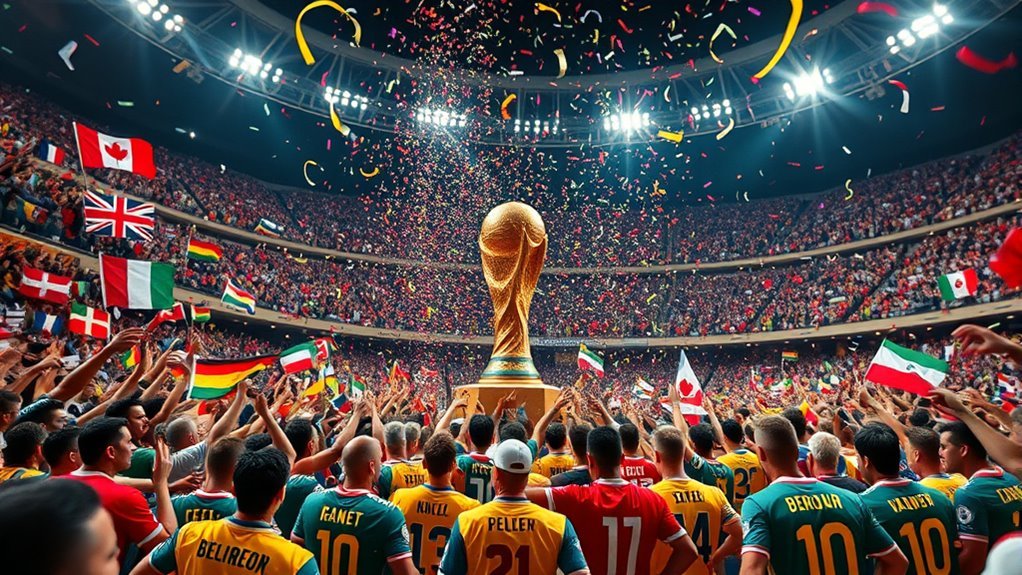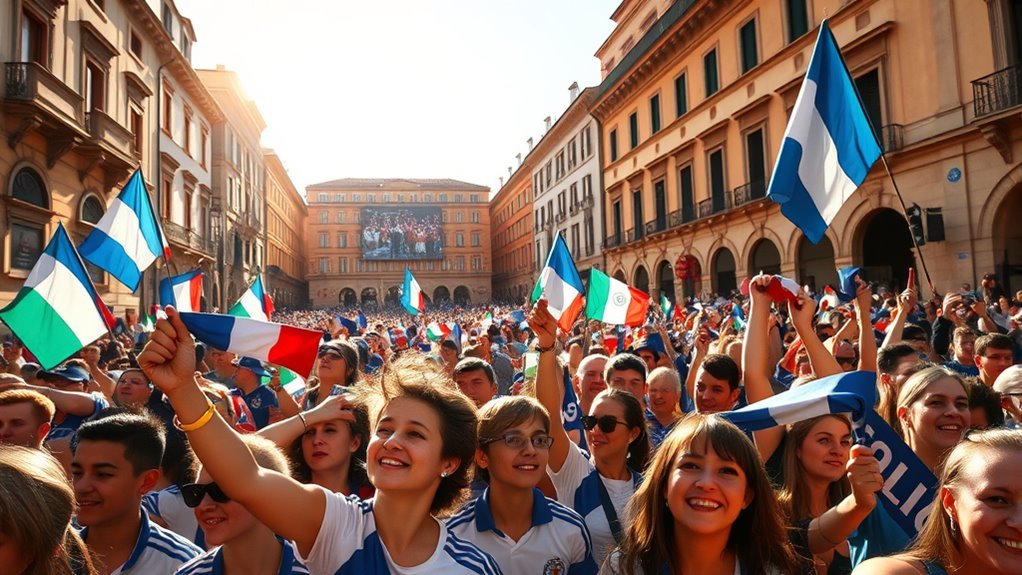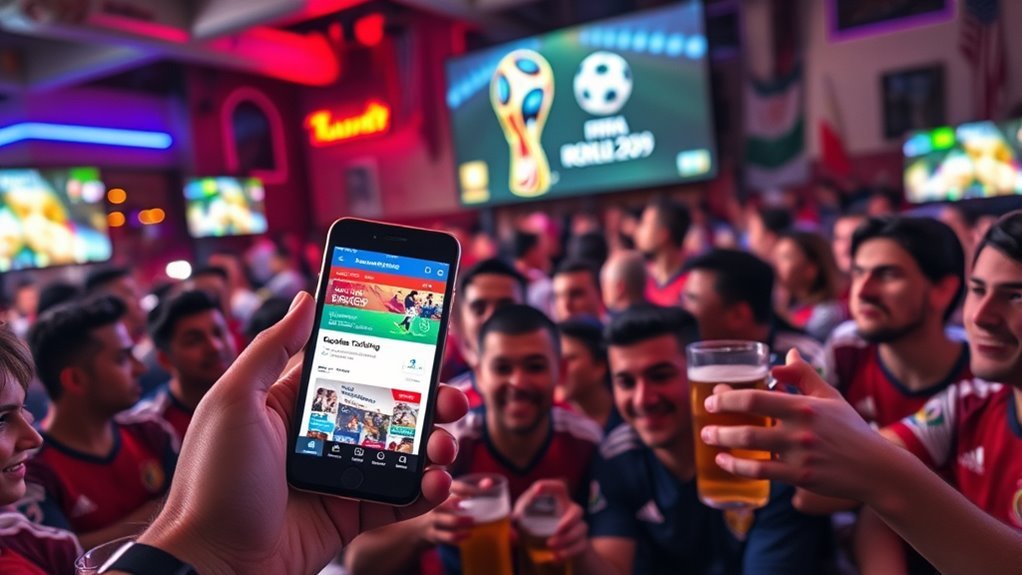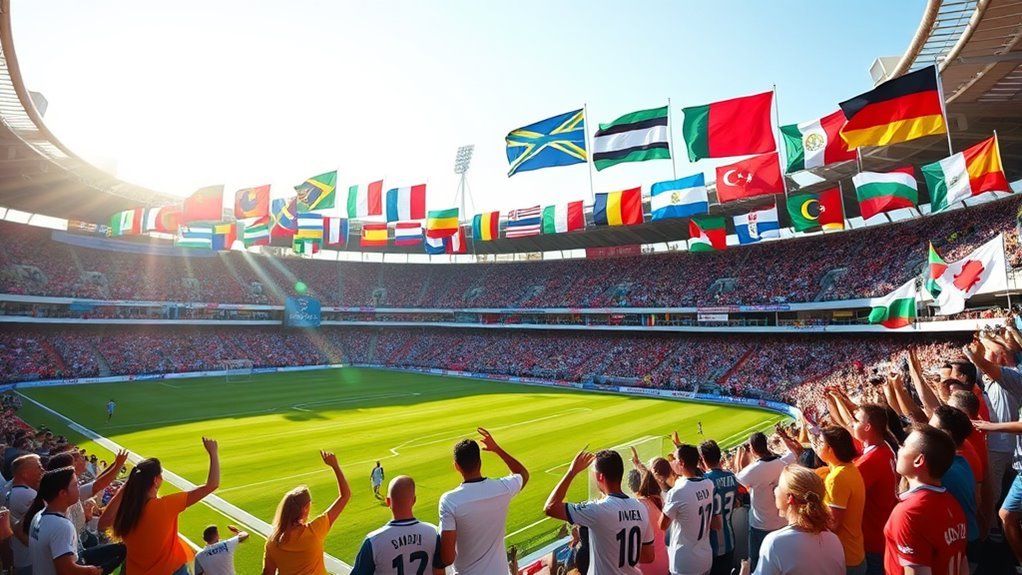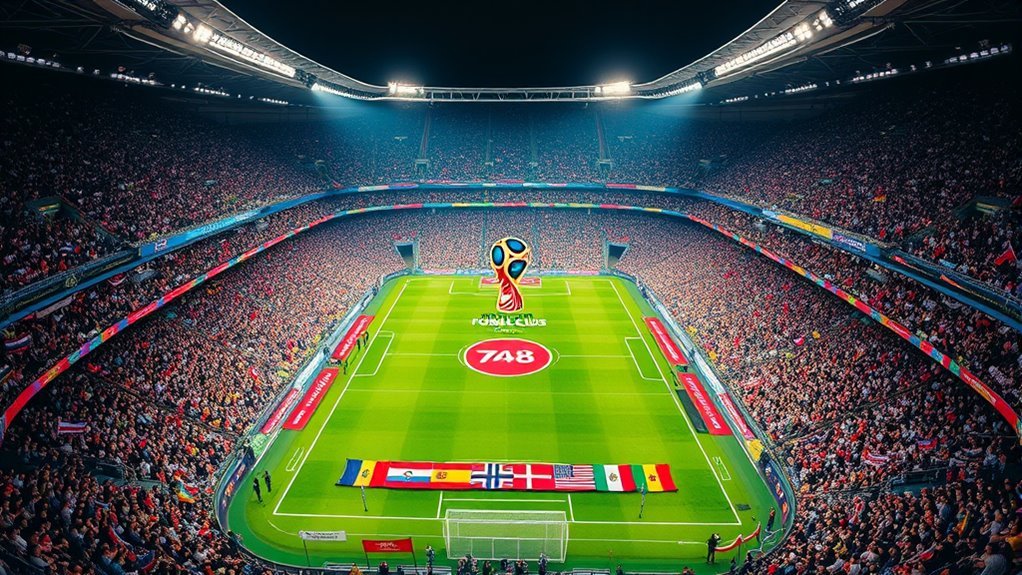The 2026 FIFA World Cup will feature 48 countries, making it the largest tournament in history. This expanded format gives more nations the chance to shine and share their unique styles of play. You’ll see intense competition with underdog teams battling for glory. It’s a celebration of football’s diversity and spirit! If you’re curious about the exciting qualifying process and what it means for global soccer, there’s much more to uncover.
Overview of the 2026 FIFA World Cup Format
The 2026 FIFA World Cup will feature an expanded format, increasing the number of participating teams from 32 to 48. This new format opens the door for more nations to showcase their talent and passion on the global stage. You’ll get to experience a tournament where diverse cultures and styles of play collide, creating an atmosphere of excitement and camaraderie.
With expanded participation, countries that have long been underrepresented can now compete, giving fans from all corners of the globe the chance to rally behind their teams. It’s a celebration of freedom in sports, where every nation has a shot at glory.
As the world comes together to witness this unprecedented event, you can look forward to thrilling matches, unexpected upsets, and unforgettable moments. The 2026 World Cup isn’t just a tournament; it’s a demonstration of the beautiful game’s ability to unite people everywhere.
Number of Teams Competing
With the exciting expansion to 48 teams, the 2026 FIFA World Cup is set to be the largest tournament in history. This team expansion brings a wave of tournament diversity, allowing more nations to showcase their talent on the global stage. You’ll love the vibrant mix of cultures, styles, and fan experiences that’ll enhance the competition.
Here are some key points about the number of teams competing:
- Increased representation from various continents
- Opportunity for underdog teams to shine
- More matches leading to thrilling moments
- Enhanced fan engagement with diverse teams
- A broader celebration of football across nations
As you gear up for this monumental event, expect an unforgettable celebration of unity and passion for the beautiful game! The 2026 World Cup promises to redefine how we experience international football.
Qualifying Process for the Tournament
As nations gear up for the 2026 FIFA World Cup, the qualifying process becomes essential in determining which teams will make the cut. You’ll see diverse teams battling it out in various qualifying rounds, each aiming for that coveted spot. The tournament expands to 48 teams, meaning more nations get a shot at glory, enhancing the thrill of competition.
Teams will participate in regional tournaments, with each confederation organizing its own unique qualification format. For example, UEFA, CONCACAF, and CONMEBOL will each have distinct pathways. You’ll witness intense matches where underdogs rise and favorites stumble, all while fans rally behind their nations.
As the excitement builds, remember that this qualifying journey not only showcases talent but also embodies the spirit of freedom and unity through sport. So, keep your eyes peeled; the road to 2026 is gonna be unforgettable!
Impact on Global Soccer
While the expansion to 48 teams in the 2026 FIFA World Cup opens new doors for nations, its impact on global soccer extends far beyond just participation. This change fosters a deeper connection among diverse cultures and promotes the beautiful game on a larger scale. You’ll see increased global participation, which can spark soccer development in regions previously overlooked.
- More countries can showcase their talent on the world stage.
- Enhanced investment in grassroots programs and infrastructure.
- Opportunities for collaboration between nations to share knowledge.
- A broader audience, creating a richer fan experience.
- Increased visibility for women’s soccer as nations aim for equality.
These elements contribute to a vibrant soccer ecosystem, empowering players, fans, and communities worldwide. Embracing this expansion means you’re part of a transformative moment in global soccer history, one that celebrates diversity and passion for the game.
Historical Context of Previous World Cups
Though the FIFA World Cup has evolved considerably since its inception in 1930, its core purpose of uniting nations through soccer remains unchanged. Each tournament tells a story of cultural exchange and competition, but it’s the historical significance of previous tournaments that shapes the current landscape of the game. You can see how the World Cup has impacted global soccer by examining these key events:
| Year | Host Nation |
|---|---|
| 1930 | Uruguay |
| 1966 | England |
| 1994 | United States |
| 2002 | South Korea/Japan |
| 2014 | Brazil |
These tournaments not only celebrated soccer but also highlighted social and political contexts, bringing nations together in ways that transcended the sport itself. Understanding this history allows you to appreciate the World Cup’s role in promoting freedom and unity among diverse cultures.
Frequently Asked Questions
Will the 2026 World Cup Have a Host City Selection Process?
Yes, the 2026 World Cup will have a host city selection process. Cities will need to meet specific selection criteria, ensuring they’re ready to embrace the world’s passion for football, igniting freedom in every match.
What Are the Ticket Pricing Ranges for the 2026 World Cup?
Ticket pricing for the 2026 World Cup varies by category, with pricing strategies aimed at making matches accessible. You can expect a range, ensuring fans have options to enjoy the excitement without breaking the bank.
How Will the Tournament Schedule Accommodate Participating Teams?
The tournament schedule’s designed to accommodate team logistics and guarantee a smooth tournament format. You’ll see flexible match times, allowing teams to recover, travel, and enjoy their freedom while competing at the highest level.
Are There Any New Rules for the 2026 Tournament?
You’ll be thrilled to know there’re exciting new formats and expanded participation rules in the 2026 tournament! It’s like soccer’s revolution, giving more teams and fans a chance to experience the thrill of the World Cup!
What Legacy Initiatives Are Planned Post-2026 World Cup?
Post-2026, you’ll see sustainability efforts focused on eco-friendly facilities and community engagement programs promoting local culture. These initiatives aim to empower communities, ensuring the World Cup leaves a positive, lasting impact long after the tournament.
